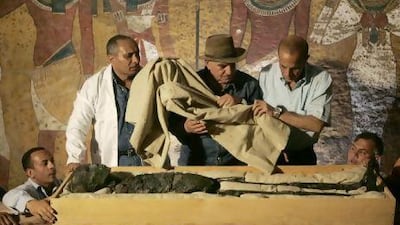CAIRO // It is finally over for Zahi Hawas, Egypt's famous, flamboyant and controversial archaeologist.
He was shuffled out last week in a cabinet change made under pressure from protesters. The Ministry of State for Antiquities, created by Hosni Mubarak just days before his overthrow on February 11 and given to Mr Hawas, was cancelled.
Mr Hawas, whose trademark Indiana Jones hat turned him into a face recognised the world over, has long been a controversial figure. His fall last week, critics say, was way overdue.
There have been accusations that discoveries announced before international media were either old ones or made by subordinates and claimed by the 64-year-old Mr Hawas. Some were hyped well beyond their significance, critics say.
Voted by Time magazine in 2003 as one of the world's 100 most influential people, Mr Hawas never shied away from the fame archaeology provided him. He recently started a fashion line named after him, featuring khaki garments similar to those worn by archaeologists in the early 20th century.
He was a fixture on the Discovery Channel, which accompanied him on the find of Queen Hatshepsut's mummy in 2007. He started his own reality show on the History Channel called Chasing the Mummies.
He prided himself on being the "keeper and guardian" of Egypt's heritage. In 2009, he told an Egyptian magazine that George Lucas, the creator of the Indian Jones films, had come to visit him in Egypt "to meet the real Indiana Jones". He engineered much of his work to promote his image, perhaps with financial gain in mind.
His name has been associated with several major archaeological digs in Egypt, with discoveries such as the excavation of the Valley of the Golden Mummies in Bahariya Oasis in 1999 and the discovery of Queen Hatshepsut's mummy nearly a decade later. But his detractors said Mr Hawas was more about theatre than scientific substance.
However, it was not Mr Hawas's flamboyance that caused his downfall. It was the perception that he was too close to the Mubarak regime.
In the new Egypt, the careers of nearly all public figures, from politicians to pop singers, are being decided by whether they were deemed as close to the ousted regime. And Mr Hawas is no exception, although he has passionately denied having done anything that went beyond the duties of a senior government official.
Looters also bedevilled Mr Hawas. On the night of January 28, looters ran free in Cairo after a day of deadly clashes between anti-regime protesters and Mr Mubarak's security forces. The Egyptian Museum, on the edge of Tahrir Square, was broken into and ransacked just hours after army troops were deployed. The soldiers did nothing to stop the criminals.
Mr Hawas initially sought to play down the value of the artefacts damaged or stolen. But he later acknowledged the seriousness of the losses, which included at least one piece from the King Tut collection.
That the museum was not adequately protected further hurt Mr Hawas, who by then had been at the helm of the Supreme Council of Antiquities for a decade.
But the looting was just the start of Mr Hawas's troubles.
Emboldened by the overthrow of the Mubarak regime, young archaeologists have gone public with years of grievances against Mr Hawas, heckling him as he arrived and left his office in Cairo. What was whispered for years turned into screams and abuse hurled at the once untouchable archaeologist.
In previous times, Mr Hawas could have dealt with the protesters by making a phone call that would have brought carloads of police who would have dispersed them.
But this was revolutionary Egypt and Mr Hawas had little choice but to endure the humiliation.
Mr Hawas's woes were compounded by the yet-unexplained disappearance of police across the nation on January 28. Dozens of warehouses where thousands of artefacts were kept had no police protection. Looters took advantage. Mr Hawas made plea after plea for the police to send men to guard the warehouses, but to no avail. Finally, he posted on his website the location of the looted warehouses and a list of the items missing.
The looting may have hurt Mr Hawas's campaign to win the return of Egyptian artefacts that had been taken out of Egypt over the years. He had repeatedly claimed to have brought back some 5,000 pieces, but the future of that campaign is now in serious doubt with Egypt's ability to protect its heritage questioned after all the looting.

